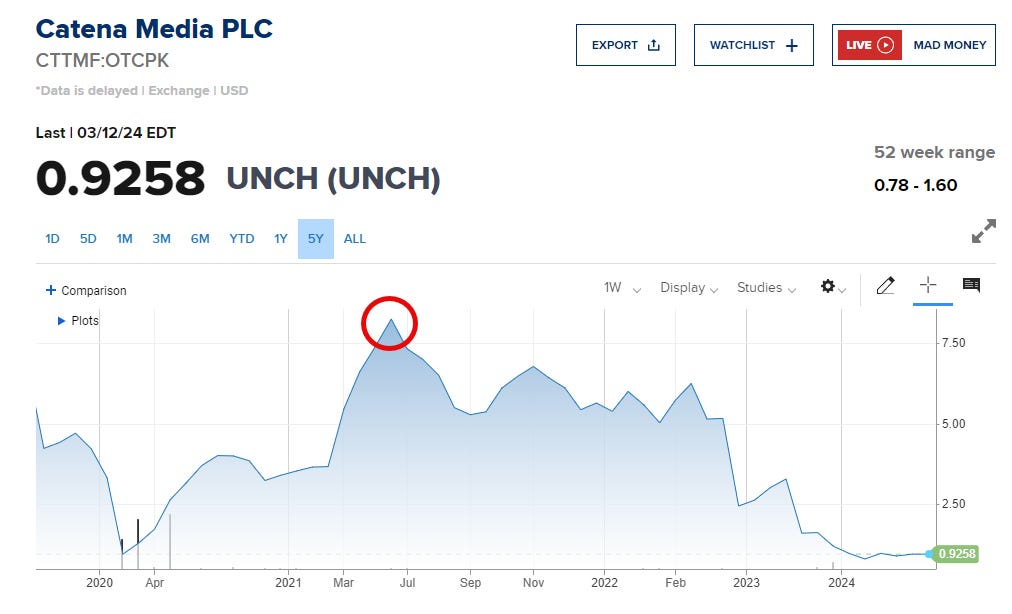There's Got To Be A Better Way
Limiting bettors isn't the solution sportsbooks want it to be. In fact, it causes a number of other problems. Fortunately, I've got a better idea.
The Bulletin Board
VIEWS: The consequences of limiting bettors.
LEGAL and LEGISLATIVE UPDATES: New Jersey extends horseracing subsidy; Kentucky court upholds skill game ban.
NEWS: Alabama Sen. President on the failure to legalize casinos, lottery, and sports betting in 2024, and where the state stands heading into 2025.
VIEWS: Catena Media appoints Manuel Stan of Kindred Group as its new CEO.
AROUND the WATERCOOLER: DraftKings handing VSIN back to Musburger.
STRAY THOUGHTS: The latest Ruddock Report and last week’s podcast guest.
SPONSOR’S MESSAGE - Sporttrade was borne out of the belief that the golden age of sports betting has yet to come. Combining proprietary technology, thoughtful design, and capital markets expertise, our platform endeavors to modernize sports betting for a more equitable, responsible, and accessible future.
Sporttrade’s newest feature, The Tape, prints all trades made on the app in real-time.
Limiting Bettors Causes More Problems Than It Solves
Apropos of the fallout from the lawsuit filed by Steven Jacobs, we need to talk about limiting bettors and how the practice led to the lawsuit.
I agree with former Ohio lawmaker Dan Dodd’s tweet, but not because I think casinos should be able to ban card counters, nor should sportsbooks be allowed to limit players who aren’t violating any betting rules.
The answer to card counters isn’t banning them, which turns into a costly game of cat and mouse. The answer is adjusting the rules and procedures of the game to weaken a card-counters advantage.
That can be anything from table minimums and maximums to how often a deck is shuffled (whether it’s a single deck or how deep into a six or seven-deck shoe a dealer is) to rules like hitting on a soft 17 to switching from 3/2 to 6/5 on a blackjack.
The way to handle winning bettors (particularly those finding holes in your pricing) isn’t limiting. That just expands the cat-and-mouse game and leads to bettors skirting rules from bearding (having others place bets for you) to the far more serious violation of opening accounts in other people’s names.
As professional bettor Rufus Peabody noted, the Jacobs-Spanky story is precisely what happens when you limit legitimate winners.
Sportsbooks need to talk to their counterparts in the blackjack pits. Banning card counters used to be the standard operating procedure, and if we go back far enough, the ban included a couple of raps on the hand from a hammer.
That is changing for two reasons:
First, casinos are realizing the cat-and-mouse game is costly, time-consuming, and doesn’t catch everyone.
Second, in some states, banning or backing off card counters is illegal. That began with the 1982 New Jersey Supreme Court ruling, Uston v. Resorts International Hotel, Inc. Missouri and Louisiana have similar rules.
The same can be said for sportsbooks limiting sharp bettors.
We are seeing that it’s not the most effective policy, considering the drama bomb the Spanky-Jacobs fiasco dropped on Sports Betting Twitter (and lord knows the last thing the industry needs right now is another fiasco) and the numerous sharps who are basically detailing their bearding activity.
And like making it illegal to ban card counters, states, beginning with Massachusetts, are starting to look at the practice of limiting bettors.
So what can sportsbooks do? Without getting into specifics, which I’m happy to do in private, the answer is to follow Blackjack’s lead.
There are policies sportsbooks could deploy that professional bettors would dislike almost as much as being limited. The goal should be to put additional checks in place that limit a sportsbook’s exposure and reduce or eliminate the reward for violating these policies.
If you remove the incentive for pros to use beards, you eliminate fiascos like the one that unfolded last week.
Legal and Legislative Updates: NJ Extends Horseracing Subsidy; KY Court Upholds Skill Game Ban
New Jersey extends $20 million annual subsidy for horseracing: In a near-unanimous vote (70-1 in the Assembly and 40-0 in the Senate), the New Jersey legislature approved a five-year extension of the annual $20 million horse racing purse subsidy. Gov. Phil Murphy is expected to sign the bill into law.
Kentucky court upholds prohibition on skill games: Pennsylvania isn’t the only locale trying to sort through the legality of “skill games.” Kentucky Circuit Judge Phillip Shepherd ruled to keep a ban on skill game machines in bars, restaurants, and gas stations in place. The ruling upholds a 2023 prohibition on the machines, HB 594. Skill-game suppliers are expected to appeal the ruling.
Alabama Senate President Talks Gambling
According to Alabama State Sen. President Pro-Tem Greg Reed, who appeared on the Jeff Poor show, the chamber was willing to tackle gambling legislation in 2024; it wasn’t “willing to embrace all of the concepts that the House of Representatives had proposed.”
The Senate was uncomfortable with several aspects, including table games and some land-based casinos, with Reed singling out sports betting as the proverbial bridge too far. “The sports betting program, some of those things our members just weren’t comfortable with,” he said.
Reed did offer some hope for 2025 and beyond, noting that gambling has come up in each of his ten years in the legislature, “But there was more accomplished this session in understanding exactly where the membership is going to be on this issue.” According to Reed, the Senate and House made clear what issues were important to them.
It’s interesting phrasing. Essentially, Reed is saying that while the two chambers may not be near a compromise, they do understand where each other needs to be to sign off on a gambling expansion bill.
SPONSOR’S MESSAGE - SUBSCRIBE NOW to Zero Latency, the new podcast from Eilers & Krejcik Gaming that provides unparalleled insight into the U.S. online gambling industry through interviews with industry insiders and analysis from EKG experts.
Catena Media Has a New CEO: Manuel Stan
After three months with an interim CEO, Catena Media has found a successor for ex-CEO Michael Daly: Manuel Stan.
Stan comes to Catena after spending the last 16 years at Kindred Group, where he helped shape the company’s affiliate program. Per the press release, he assumed the CEO role on July 1, taking over from acting CEO Pierre Cadena.
It’s been a rough couple of years for Catena Media. The former #1 affiliate in the US underwent a strategic review that resulted in the selling off of several assets, including one of its flagship European properties, AskGamblers, along with assets in the UK, Italy, and Australia, as it shifted its focus almost entirely to the North American market.
The company’s struggles also led to the resignation of CEO Michael Daly, who took over the CEO role in March 2021.
Consistently negative quarterly earnings reports sent the stock price plummeting from a high of $8.40 in June 2021 to under $1 today - the big drop coming at the end of 2022.
Around the Watercooler
Social media conversations, rumors, and gossip.
According to Eilers & Krejcik Gaming (a newsletter sponsor) channel checks, DraftKings is close to divesting itself from VSIN. Per EKG, the buyer is founder Brent Musberger, who could reacquire VSIN for pennies on the dollar in a Barstool-esque deal.
DraftKings bought VSIN in March 2021 for a hefty $70 million. At that time, everyone wanted to acquire or partner with media brands and content creators like Dan Le Batard and Pat McAfee. These were believed to be the perfect acquisition channel, giving operators a direct line to bettors.
That has proven more complicated than expected, evidenced by the Penn-Barstool divorce, the failures of Maxim Bet and SI Sportsbook, and now the rumored VSIN buyback.
As EKG pointed out, the last five years have demonstrated “that media companies don’t necessarily make good betting companies,” and vice versa.
Stray Thoughts
You can read the latest installment of The Ruddock Report, a monthly breakdown of the online casino situation in the US, over at Casino Reports. This month, I look at what factors make a state a legalization contender, the (slim) possibility of New York legalizing online casinos this year, and a close look at Florida’s potential.
And ICYMI: I had Brianne Doura-Schawohl on the podcast last week to talk about lobbying and how gambling policy is made.










